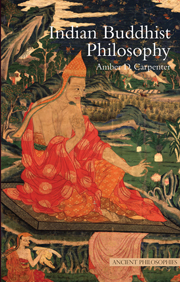Book contents
- Frontmatter
- Contents
- Preface
- Acknowledgements
- Abbreviations
- Chronology
- Development of Buddhist thought in India
- 1 The Buddha's suffering
- 2 Practice and theory of no-self
- 3 Kleśas and compassion
- 4 The second Buddha's greater vehicle
- 5 Karmic questions
- 6 Irresponsible selves, responsible non-selves
- 7 The third turning: Yogācāra
- 8 The long sixth to seventh century: epistemology as ethics
- Epilogue
- Background information
- Appendix 1 The languages of Buddhism
- Appendix 2 Intellectual context
- Appendix 3 The Abhidharma
- Appendix 4 Snapshot of Indian philosophy
- Notes
- Bibliography
- Index
Appendix 3 - The Abhidharma
from Background information
- Frontmatter
- Contents
- Preface
- Acknowledgements
- Abbreviations
- Chronology
- Development of Buddhist thought in India
- 1 The Buddha's suffering
- 2 Practice and theory of no-self
- 3 Kleśas and compassion
- 4 The second Buddha's greater vehicle
- 5 Karmic questions
- 6 Irresponsible selves, responsible non-selves
- 7 The third turning: Yogācāra
- 8 The long sixth to seventh century: epistemology as ethics
- Epilogue
- Background information
- Appendix 1 The languages of Buddhism
- Appendix 2 Intellectual context
- Appendix 3 The Abhidharma
- Appendix 4 Snapshot of Indian philosophy
- Notes
- Bibliography
- Index
Summary
The early Buddhist texts are typically grouped into three kinds, known as the three Pitakas (‘baskets’ or collections) – together the Tripitaka:
The Sutta Pitaka comprises the nikayas, collections of the discourses of the Buddha:
The Samyutta Nikāya (the Connected Discourses)
The Majjhima Nikāya (the Middle-Length Discouses)
The Dīgha Nikāya (the Longer Discourses)
The Anguttara Nikāya (the Gradual or Enumerated Discourses)
The Khuddaka Nikāya (the Minor Discourses)
The Vinaya Pitaka comprises all texts concerned with monastic discipline, which could vary in details according to sect. It is a rich source for examples of moral reasoning.
The Abhidharma (or Abhidhamma) Pitaka is the ‘Higher Teaching’, where the Buddha's teachings are distilled, organized and sometimes explored. The texts of the Pāli Abhidharma canon are:
The Dhammasaṅgaṇi (the Enumeration of Phenomena, translated under the title Buddhist Psychological Ethics)
The Vibhanga (the Book of Analysis)
The Dhātukathā (Discussion of Elements)
The Puggalapaññatti (Concept of Persons or Designation of Human Types)
The Kathāvatthu (Points of Controversy)
The Yamaka (the Book of Pairs)
The Paṭṭhdna (Conditional Relations)
There were variations on the Sutta-Pitaka, just as in the Vinaya texts, with different early Buddhist groups recognizing only partially over-lapping subsets of each others' sūtras as authentic. The Pāli canon is that of the Theravādins. The only other extant Abhidharma canon is that of the Sarvāstivādins, preserved only in Chinese translation.
- Type
- Chapter
- Information
- Indian Buddhist Philosophy , pp. 246 - 247Publisher: Acumen PublishingPrint publication year: 2013



